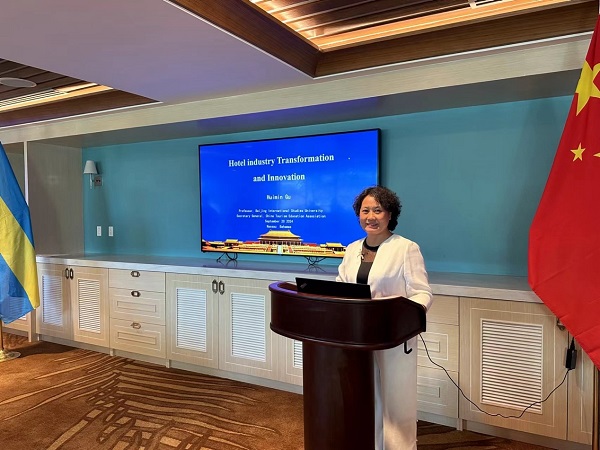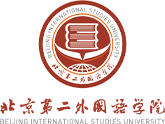
Gu Huimin, a professor at the School of Tourism Sciences at Beijing International Studies University (BISU) was recently invited to deliver lectures at a training course in Nassau, Bahamas.
Her four lectures focused on China's national conditions, hotel transformation and innovation, hotel environmental, social and governance (ESG) strategies and sustainable development, and the behavior of and marketing for Chinese outbound tourists.

Gu Huimin delivers a lecture on hotel industry transformation and innovation in Bahamas.
Gu provided a comprehensive overview of China's history, geography, politics and economy in her lecture on China's national conditions. Using data and case studies, she illustrated the country’s reform and opening up, as well as the Chinese modernization.
Gu explored the developments in the hotel industry at home and abroad in the lecture on hotel transformation and innovation, with a particular focus on boutique hotels. She examined how customer experiences have changed in the context of the experience economy, the deep integration of culture and tourism in the hospitality industry and the strategies behind the digital transformation of hotels.
She also shared innovative practices from prominent Chinese hotel enterprises, such as Atour, H World, and Songtsam, highlighting their role in driving industry change.
She emphasized the critical importance of implementing ESG principles in the hospitality industry when discussing about hotel ESG strategies and sustainable development. With a theoretical framework and key components of ESG presented, she reviewed global ESG evaluation systems, and outlined the strategies and initiatives adopted by hotel groups like Hilton and H World to address environmental, social, and governance issues.
Finally, in her discussion on consumer behavior and marketing in the context of Chinese outbound tourism, she analyzed the current status of such tourism, including the post-pandemic recovery. Delving into the changes and characteristics of the Chinese tourist's consumption behavior with detailed data, she offered insights into the consumer preferences regarding destinations, products, services, booking decisions and channels.
Additionally, she shared effective promotional practices targeting Chinese outbound tourists applied in countries and regions such as the United States, Thailand, Malaysia, and the Maldives.
Using big data, she also examined the image and perception of the Bahamas among Chinese consumers, providing recommendations for improving the country's appeal to this market.
The lectures received high praise from the participants.
The Overseas Training Course on Operation and Management of Small Boutique Hotel in the Bahamas, which was held from Sept 19 to 25, attracted 32 participants, consisting of personnel from the Bahamas Ministry of Tourism, Investment and Aviation, as well as stakeholders from the hotel industry. They attended lectures and engaged in discussions as well as on-site activities.
Organized by the Ministry of Commerce (MOC) and hosted by the Academy for International Business Officials under the MOC, the event aimed to foster a global exchange of knowledge in the hospitality industry.

Links
